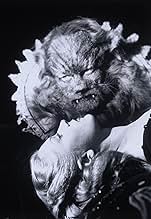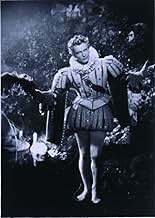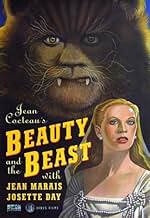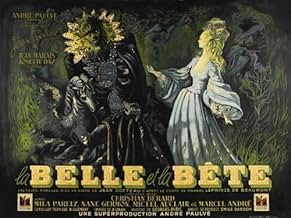Eine schöne junge Frau nimmt den Platz ihres Vaters als Gefangener eines mysteriösen Wesens ein, das sie heiraten möchte.Eine schöne junge Frau nimmt den Platz ihres Vaters als Gefangener eines mysteriösen Wesens ein, das sie heiraten möchte.Eine schöne junge Frau nimmt den Platz ihres Vaters als Gefangener eines mysteriösen Wesens ein, das sie heiraten möchte.
- Auszeichnungen
- 1 Gewinn & 2 Nominierungen insgesamt
- Merchant
- (Gelöschte Szenen)
- (Nur genannt)
- The Father
- (Gesang)
- …
- La Bête
- (Gesang)
- …
- Voice of Magic
- (Synchronisation)
- (Nicht genannt)
- Footman
- (Nicht genannt)
- Footman
- (Nicht genannt)
Empfohlene Bewertungen
The amazing set design also impressed me about this film. Again, without the modern conveniences of today's cinema, Cocteau had to improvise. This was hard for him to do. Not only were there huge budgetary issues (since it was the end of WWII and France was about to be demolished), but also he was racing against an impending war. Fear was deep in the hearts of the French after WWII, and what a better way to rally your people then with a story about love found in the darkest of places.
This film also made me very sad. I am sometimes disgusted with the way that Disney ... for lack of a better word ... Disney-fies their fairy tales. I think after watching this masterpiece I will have trouble ever being able to go back to the computer generated "Song as Old as Time" version that Disney plastered their trademark to. Never have I been so impressed with black and white cinematography as I have been with this film. The actress that plays Belle, Josette Day, steals the camera every time it is on her. She looks so radiant with the black and white that to see a colorized version of this film would completely do it injustice. The power and emotion that comes between Belle and the Beast feels so true. Cocteau has somehow grabbed the true feeling of two people that are complete opposites that seem to find true love in the coldest of places. I would be one of those reviewers that believes that if this film were released today, it would still pull the audiences in as it did the first time. Only proving that it was made well before it's time, it shows so many of the characteristics of the modern day movie. Even the special effects seem perfect for this film. Even with budget being sub-par, we are able to get a true feeling that this Beast is one of the magical kind.
Oh, this film was superb. I would have to say that it is the best adaptation of a fairy tale that I have seen today. Definitely my best 40s film (made in 1946), and possibly the best telling of Beauty and the Beast EVER!!
Grade: ***** out of *****
So much for watching it through a child's eyes and accepting the fantasy at face value! At the beginning Cocteau states "Once upon a time...", but really for discerning adult cineastes (and/or poets) to drop their guards and enjoy it for what it was - a magical filmic fantasy. It's uniformly marvellous in all departments, direction, photography, acting, music, design, and Cocteau trotted out all his favourite cinematic tricks - just part of the sequence between Blood of a Poet in '30 and Testament of Orphee in '61. The script was suitably steeped in non sequiteurs and puzzles to add to the heaviness of it all. Er, not that it matters but what happened to Ludovic?
The wonderful dark brooding smoky atmosphere is the most important aspect though - there are few films I've seen with such a powerful cinematic atmosphere, Reinhardt's Midsummer Night's Dream is one and Dead of Night another etc. But the romantic melancholic atmosphere here was something ... incredible. It was only possible with black and white nitrate film stock to capture such gleaming, glistening and time- and place-evoking moving images - it hasn't been quite the same since 1950 with safety film in use.
If you're an adult about to give it your first (let yourself) go, I envy thee! All in all a lovely inconsequential fantasy, make what erudite and informative allegorical allusions you will.
The tale is one of awakening, of desires, and of strange surroundings. Living statues and disembodied arms holding candles aloft populate the twilight world of the Beast's castle, where the fate of a young girl turns on the plucking of a rose. Ghostly voices, choral and otherwise, shadows and softness accompany Beauty as she walks into the kingdom which first repels and then entrances her.
I have to agree with the view that the great Greta Garbo took of this movie, though: give me back my Beast'. The transformation from powerful feline seducer to run-of-the-mill Prince is a disappointment. It is during the scenes where Beauty and the Beast play out their fantasy that this film has its most potency.
The classic fairy tale is given remarkable treatment by Jean Cocteau as he tells the tale of a beautiful girl who falls in the love with a tortured but charming Beast (played by Jean Maris in a stunning performance). This movie just seems to have it all: it's visuals are very impressive, the romance is very charming and not at all phoned in, the story is engaging and surprisingly tense, and the acting is just superb. Although there are no big movie names, you won't care for a second as this talented group will win you completely over.
Not only is this fantasy at it's very best, it often comes off more as a poem rather than a movie but you won't care. It's one of the most visually dazzling poems ever put on film.
Wusstest du schon
- WissenswertesThe effect of the candles lighting themselves as the merchant passes them was achieved by blowing them out and then running the film in reverse as he walked backward past them. The entire sequence was done in one long take and reversed - a quick glimpse of the fireplace shows the flames appearing to move downward.
- PatzerAs Belle and The Beast walk in the garden, a comparatively modernly dressed boy in short pants is visible for a few seconds to the top right behind them.
- Zitate
Opening Title: Children believe what we tell them. They have complete faith in us. They believe that a rose plucked from a garden can plunge a family into conflict. They believe that the hands of a human beast will smoke when he slays a victim, and that this will cause the beast shame when a young maiden takes up residence in his home. They believe a thousand other simple things. I ask of you a little of this childlike simplicity, and, to bring us luck, let me speak four truly magic words, childhood's "Open Sesame": "Once upon a time..." Jean Cocteau
- Crazy CreditsThe title and some of the opening credits are written with chalk on a blackboard, and then erased.
- Alternative VersionenThe 1946 American release of the film had an entirely different set of opening credits, and is the one available on VHS. In that release, these credits were presented straightforwardly, with nothing unusual about them, and with the title in English. In the film's original release, available on DVD, the credits were written on a blackboard, in what is known as cursive handwriting, the same type of writing in which the opening prologue appears. After every credit, Jean Cocteau's hand would erase it and write the next credit with what appeared to be chalk. Then, after the credits ended, a film clapboard was seen, it was slammed together, as they always are just before a film director yells "Action!", and then the film's written prologue was seen.
- VerbindungenEdited into Geschichte(n) des Kinos: Fatale beauté (1994)
- SoundtracksLa belle et la bête
an opera by Philip Glass
(Not part of the original soundtrack, and not heard in the film's first two releases)
© 1995 Nonesuch Records for the US and WEA International Inc. for the world outside of the United States
Top-Auswahl
Details
Box Office
- Bruttoertrag in den USA und Kanada
- 298.718 $
- Eröffnungswochenende in den USA und in Kanada
- 3.708 $
- 23. Juni 2002
- Weltweiter Bruttoertrag
- 298.718 $
- Laufzeit
- 1 Std. 30 Min.(90 min)
- Farbe
- Sound-Mix
- Seitenverhältnis
- 1.37 : 1

















